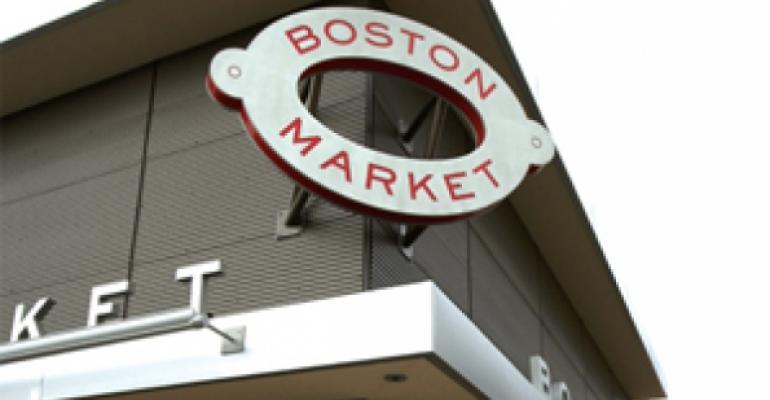Even absent any current pressure from activist investors for “enhanced shareholder value” through spinoffs, McDonald’s Corp. could be poised to put billions on its top line through divestments of its Latin American holdings and the 630-unit Boston Market chain.
The leader of Golden, Colo.-based Boston Market this month alerted employees that the fast-casual chain may be sold by McDonald’s, its owner for about seven years, which would mark a continued shift by the burger giant away from brand diversification.
A Boston Market spokes-woman confirmed that the non-franchised chain’s chief executive, Michael Andres, had alerted his employees to that possibility during an annual state-of-the-company meeting Jan. 11 at the home-meal-replacement specialist’s headquarters.
Later, McDonald’s issued a statement saying it would assess its options during 2007, but the company had not decided whether to divest Boston Market or what form an exit might take.
As of presstime, McDonald’s had not commented on a report early this month by a prominent analyst that said the company could sell its lucrative corporate operations in Latin America as early as this month for as much as $1.8 billion.
The owner of the world’s largest restaurant brand two years Ago sold a 50-percent stake in the 3,500-plus-unit McDonald’s Japan system in an initial public offering and has been steadily pruning its fold of secondary brands.
Boston Market’s CEO: McD eyes sale of 630-unit chain
Enabling the Oak Brook, Ill.-based company to devote more resources and attention to its resurging namesake chain, McDonald’s last year spun off Chipotle Mexican Grill through a $320 million IPO and the subsequent distribution of McDonald’s remaining stake in the Denver-based burrito chain as a special dividend to McDonald’s shareholders.
About three years earlier, McDonald’s divested a stake in the Fazoli’s fast-casual Italian chain and sold Donatos back to the pizza chain’s founders. At one time, McDonald’s also held a stake in Aroma, a European coffee concept.
A sale or IPO of Boston Market would leave McDonald’s with only one other nonburger restaurant holding—its estimated one-third interest in the London-based Pret A Manger grab-and-go sandwich specialty chain, which has struggled to convert a toehold in New York City into meaningful U.S. market growth. McDonald’s also holds about a 53-percent stake in the Redbox DVD-vending business, which plans to expand its fleet of rental machines to a total of 1,600 McDonald’s units by July.
McDonald’s in 1999 agreed to buy Boston Market out of bankruptcy in a $173.5 million deal driven largely by the chicken specialty chain’s real estate. However, according to McDonald’s insiders, the burger giant discovered that it had a profitable business on its hands once costly leases were renegotiated. Just the licensing deal that put the Boston Market name on frozen grocery store entrées generated high-margin sales of more than $100 million annually.
McDonald’s once sought to compete with Boston Market by developing a similar, but short-lived, concept called Hearth Express.
Suggesting that Boston Market could fetch substantial proceeds if taken public or sold outright, the chain, which operates in 28 states and has no franchisees, generated an estimated $710 million in U.S. sales in 2005, a 5.2-percent annual increase, according to Nation’s Restaurant News’ Top 100 study.
The separate divestiture of McDonald’s Corp.’s Latin American operations, according to Mark Kalinowski, a restaurant analyst for the Buckingham Research Group in New York, could yield a price of up to $1.8 billion as early as this month and shift “operational control” of the company’s holdings in Brazil and Argentina.
Citing “industry sources,” Kalinowski said the buyers could include UBS Pactual, GP Investments and an Argentine businessman named Wood Staton, who already operates McDonald’s units in his home country.
The sale of those corporate operations to licensees would lower the brand owner’s risk in the region while yielding a steady stream of royalties, Kalinowski predicted.
McDonald’s has been beset in recent years by costly legal troubles with licensees in Brazil.
Kalinowski speculated that proceeds from a Latin American sale might be used by McDonald’s to repurchase shares or as a one-time special dividend.
For the quarter ended last Sept. 30, McDonald’s Corp.-operated restaurants in Latin America generated sales of $406.1 million, up 23 percent from a year earlier, the company reported. For the nine months ended Sept. 30, those sales had risen 28 percent to nearly $1.12 billion. As of Sept. 30 the entire Latin American McDonald’s system had outpaced all other regions worldwide in terms of growth in same-store sales, which rose 15.4 percent and 14.6 percent for those periods, respectively, versus the chain’s worldwide average of 5.8 percent and 5.5 percent for the quarter and nine months.
In McDonald’s most recent annual report, for 2005, it cited the “risks of operating in markets, such as Brazil and China, in which there are significant uncertainties, including with respect to the application of legal requirements and the enforceability of laws and contractual obligations.”
However, in that same report McDonald’s said that for 2005 and 2004 its margins from company-operated restaurants in Latin America had “reflected improved performance, driven by strong comparable sales in Brazil, Argentina and Venezuela.”
For all of 2005, McDonald’s Corp. operations in Latin America yielded a gross operating margin of $141 million, or 11.4 percent of the company’s gross margin from corporate outlets worldwide. The Latin American corporate-store margin improved for that year from a 9.5-percent-of-worldwide result in 2004, when the region yielded a margin of $89 million.
In 2005, McDonald’s Corp.’s restaurants in Latin America generated nearly $1.24 billion in revenues, while the region’s revenues from franchising totaled $90 million, up for the year by $304 million and $15 million, respectively.

